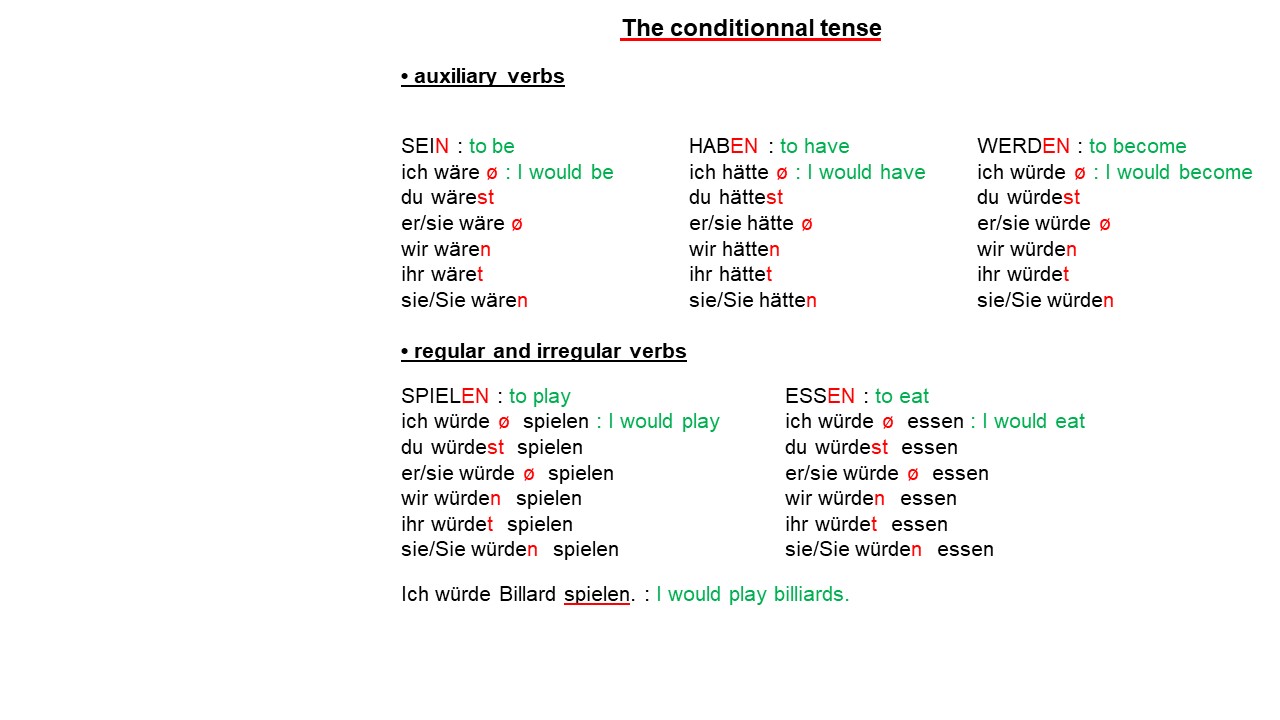Language/German/Grammar/Conditional-Mood
The conditional tense is called "Konjunktiv II (zwei)" in German. It is used to talk about things that are pure hypothetical. Note that there are to ways to form the conditional tense: the first one is a real verbal form, the second one is perphrastic. "Ich sänge" is the real verbal form: I would sing. "Ich würde singen" is the periphrastic form. There is no difference in meaning. But there can be a difference in style. The simple form belong often rather to formal speech. With some verbs though, the simple form ist quite common. You can see the most common simple forms her. The verbs "sein, werden und haben" have very common conditional forms. Notice that these forms can quite simply be derived from the past tenses of the verbs by adding umlauts: ich war becomes ich wäre and so forth.
 With "spielen" and "essen", the table above shows the perphrastic form: Conditional of "werden" plus infintive of the verb. Notice the simple form, which can again be created by umlauting the past form. "ich spielte" becomes "ich spielte". There is just no umlaut for "ie"! This is a major problem of the simple form. If there is no legal way to umlaut the stem vowel, the form just doesn't change. With "essen" you have the past tense "ich aß". This allows an umlaut and will yield "ich äße". The form is theoretically correct and you can use is. But be warned: Unless you are Goethe or you are writing a formal essay, you will either get misunderstanding or laughter. The form is not really used. Instead, we say "Ich würde essen".
With "spielen" and "essen", the table above shows the perphrastic form: Conditional of "werden" plus infintive of the verb. Notice the simple form, which can again be created by umlauting the past form. "ich spielte" becomes "ich spielte". There is just no umlaut for "ie"! This is a major problem of the simple form. If there is no legal way to umlaut the stem vowel, the form just doesn't change. With "essen" you have the past tense "ich aß". This allows an umlaut and will yield "ich äße". The form is theoretically correct and you can use is. But be warned: Unless you are Goethe or you are writing a formal essay, you will either get misunderstanding or laughter. The form is not really used. Instead, we say "Ich würde essen".
Things are never simple in German. In writing, a sentence this to many "würde" sounds clumsy. So use "würde" with care. As a rule of thumb, use the simple forms for "sein, haben, werden" and the periphrastic form for all the rest.
We are have a conditional form of the past. Take the compound past form and put the auxilliary in the conditional. "Ich habe gegessen" becomes "ich hätte gegessen", "Ich war gewesen" becomes "ich wäre gewesen". If you feel extremely confident about your German, try to figure out some passive forms: "ich bin gefragt worden" becomes "ich wäre gefragt worden" and so on.

